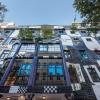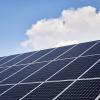
The first Vienna Climate Biennale started its 100 day long festival program in April. CircEUlar is among the scientific partners of the Biennale, providing content on the potential of circular economy strategies to combat climate change.
In preparation of the opening of the Vienna Climate Biennale, CircEUlar – a Horizon Europe funded project coordinated by the Energy, Climate, and Environment Program at IIASA – held a joint networking event with the Vienna Climate Biennale in January, bringing together artists, policymakers, representatives of businesses and civil society, and researchers from different disciplines tackling the climate crisis.
Held at the University of Natural Resources and Life Sciences (BOKU), Vienna, Institute for Social Ecology, the evening began with a brief introduction by the CircEUlar project partners and Biennale colleagues, after which people were encouraged to move around the space and engage with materials displaying advances in the field of climate science and the circular economy.
At the Vienna Climate Summit, which is set to take place on 24 and 25 June 2024 at Kunsthaus Wien, the CircEUlar project will present some of its findings, mediated through the lens of artists. Under the title Sensing Resonance, Nora Mayr – a well-known independent curator living in Vienna and Berlin – curates meetings between four groups of researchers from CircEUlar with the artists Imayna Caceres, Barbara Kapusta, Julian Palacz, and Borjana Ventzislavova.
When Art Meets Science
Together with the Euro-Mediterranean Centre for Climate Change (CMCC) – a CircEUlar project partner – IIASA engaged in a dialogue with the visual artist Barbara Kapusta to present a selection of findings from the development of Narratives for Circular Economy-driven Net-Zero Emission Pathways, intertwined with artistic interpretation.
Building on existing data and the potential for reaching net-zero emissions toward the middle of the century, the project is developing narratives for various future scenarios to facilitate the integration of circular economy principles. At the heart of the project lie principles such as dematerialization, extending the lifespan of material stocks, and enhancing waste treatment. Additionally, it examines the boundary conditions — geopolitical, economic, and psychological — that may either facilitate or impede change, while delving into the pivotal question, “How might possible futures unfold if we successfully adopt certain circular production and consumption practices?” through a dynamic synergy of art and science. Collaborating with stakeholders from policy, businesses, and civil society, the project aims to co-develop narratives that explore the acceptance and adoption of circular production and consumption practices in Europe and give us insights into potential future outcomes.
This collaborative journey with Vienna Biennale serves as a testament to IIASA’s unwavering commitment to fostering interdisciplinary exchanges and innovative solutions.
The CircEUlar Project has received funding from the Horizon Europe Research and Innovation Action Programme under Grant Agreement No. 101056810, the Swiss State Secretariat for Education, Research, and Innovation (SERI), and by UK Research and Innovation UKRI.
Adapted from a press release prepared by the Vienna Climate Biennale. Read more here.
News

04 July 2024
ALFAwetlands: assessing mid-term project milestones

26 June 2024
Wavelet phase difference and granger causality: Evidence connecting phase difference inference to granger causality

29 April 2024

